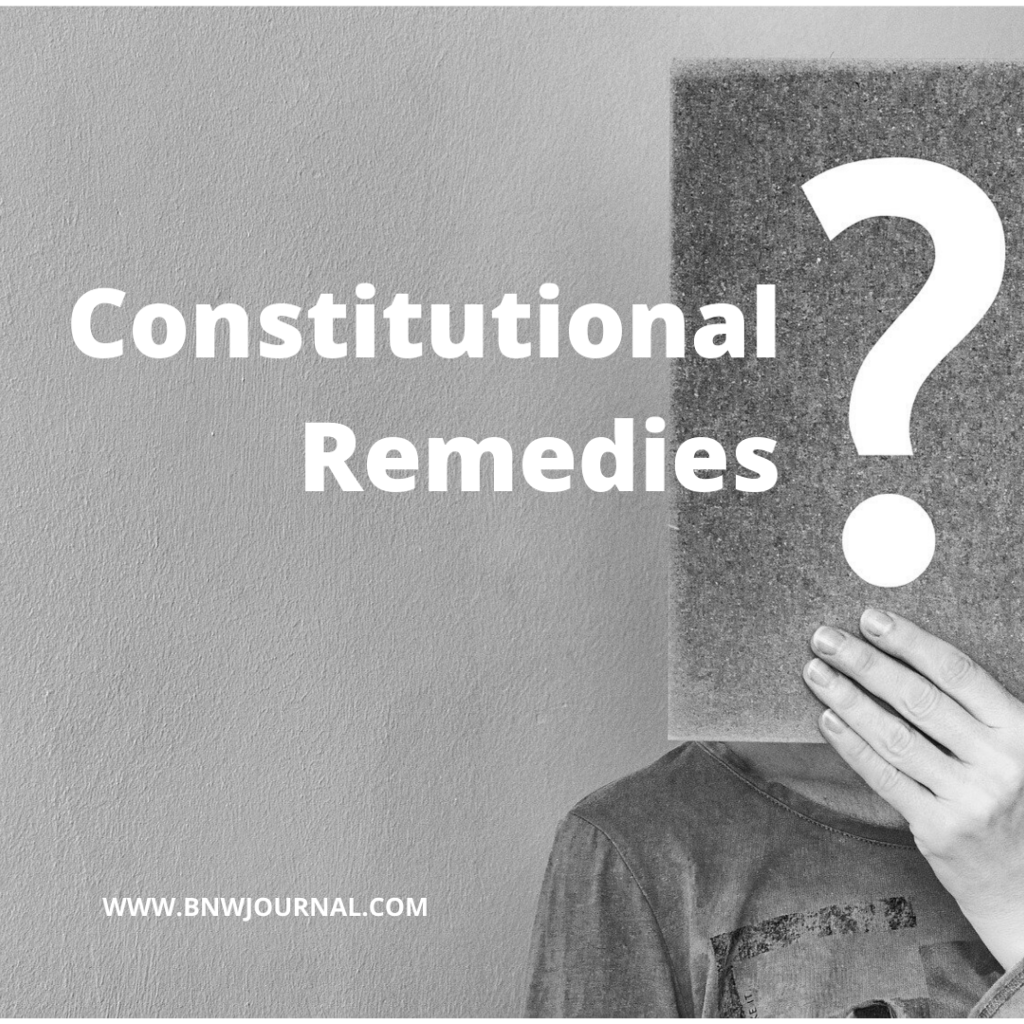![]()
INTRODUCTION
Dr. BR Ambedkar called Article 32 of the Indian Constitution i.e. constitutional remedies as the heart and soul of the constitution. The constitution felt the need of protecting the rights of the citizens; therefore right to constitutional remedy is create as one of the main fundamental rights. The state is prohibit from making any law that might conflict with the fundamental rights. Article 12 to 35 of the Indian Constitution consists of Fundamental Rights.

The individual has the power to move the court of law in case of denial of any of those fundamental rights. When the individual moves the court of law, the court has the power to issues writs in the form of habeas corpus, mandamus, prohibition, quo warranto, and certiorari.
What is a Writ?
Writs are constitutional remedies provide in a form of a written order issued by the Supreme Court or High Court of India to protect the citizens from violation of their fundamental rights.
- High Courts have the power to issues writs under Article 226.
- English Law gave the concept of writs in India.
- Parliament is empowere under Article 32 to authorize any other court to issue the writs.
Types of Writs
- Habeas corpus
- Mandamus
- Certiorari
- Prohibition
- Quo-warranto
HABEAS CORPUS
Habeas corpus means, YOU MAY HAVE THE BODY. This writ is issue to produce the person before the court who might have been detain in prison or private custody. If the detention is find illegal, such a person is release. This writ is issue to protect the liberty of an individual against unlawful detention.
MANDAMUS
Mandamus means, WE COMMAND. It is an order to a lower court or tribunal from the Supreme Court or High court to perform a certain public duty. It is issue when a public authority fails to do a public duty assign to it and is issue by the Supreme Court or High Court of India.
This writ cannot be issue against the private individual.
CERTIORARI
Certiorari means to be certified. This writ is issue to an inferior court with the intention of overruling the judgment of the inferior court or quashing the order passed by the inferior court or tribunal.
It is issued by the higher court in cases of:
- Over jurisdiction: When the court or tribunal has passed an order exceeding its jurisdiction.
- Lack of Jurisdiction: When the court or tribunal has passed an order in a matter where it lacks its jurisdiction.
PROHIBITION
Writ of Prohibition means to stop. It is issued when the higher court thinks that the case falls outside the jurisdiction of a lower court and prohibits the lower court from continuing the proceedings in a particular case where it lacks jurisdiction. It is issued against any legal body.
Difference between Certiorari and Prohibition
Writ of prohibition is available when the proceedings are still pending.
Writ of certiorari can be issued only when the order is passed by the lower court or tribunal.
QUO-WARRANTO
Writ of quo-warranto means, by what warrants or by what authority. It is issued to stop a person from holding a public office to which he is not legally entitled. The concerned person needs to prove his authority to hold that public office in front of the court. With the help of this writ, the court enquires the person who claims the office that by what authority he is claiming that public office.
Conditions for issue of Quo-Warranto
- There must be a public office.
- The office should be a substantive one.
- There is a contravention of constitution or statute, when such person is appointed to the office.
SUSPENSION OF FUNDAMENTAL RIGHTS
- Fundamental rights can be suspended under Article 352 in the case of the National Emergency.
- The rights given under Article 20 and 21 can never be suspended.
- There is a clause in Article 359 for suspension of other rights in which a separate notification needs to be issued by the President.
- There are two other emergencies in the country other than National Emergency i.e. Constitutional emergency and Financial Emergency. There is no effect on Fundamental Rights in the case of Constitutional Emergency and Financial Emergency.



1 Comment
Umadevi · 07/07/2020 at 8:48 AM
These articles are highly informative and helpful as they as brief and precise , thanks a lot